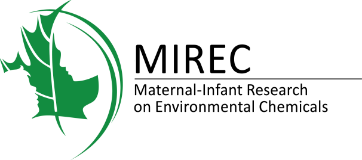
Prenatal exposure to PFAS and the association with neurobehavioral and social development during childhood.
Saha T, Gbemavo MCJ, Booij L, Arbuckle TE, Ashley-Martin J, Fisher M, Muckle G, Lanphear BP, Asztalos E, Séguin JR, Bouchard MF. International Journal of Hygiene and Environmental Health 2024 Sep 25;263:114469. doi: 10.1016/j.ijheh.2024.114469
Question: Is prenatal exposure to PFAS associated with children’s behavioral and social problems?
Per- and polyfluoroalkyl substances (PFAS) are a group of thousands of human-made chemicals that are used as lubricants and repellents for dirt, water and grease in a wide range of products (e.g., food packaging materials, electronics, cosmetics).
What did the researchers do:
Concentrations of 3 PFAS (perfluorooctanoate (PFOA), perfluorooctane sulfonate (PFOS), and perfluorohexane sulphonate (PFHxS)) were measured in first-trimester blood from 757 women from the MIREC study. As part of the MIREC-CD Plus study, children were assessed at 3-4 years with the Behavior Assessment System for Children-2 (BASC-2) (n=756) and the Social Responsiveness Scale-2 (SRS-2) (n = 496). Researchers from the Institut national de la recherche scientifique (INRS) examined associations between PFAS levels and scores on these tests for behavior and autistic-like characteristics.
What did they find:
PFOA was related to significantly lower scores in boys for these BASC-2 scales: Behavioral Symptoms Index, Externalizing Problems, Aggression, and Hyperactivity. In girls, however, PFAS were associated with more problem behaviors, but most associations were small, with the exception of PFOA being significantly associated with higher scores for the BASC-2 Anxiety scale.
What does this mean:
Overall, this study found that increased exposure to the PFAS during pregnancy were not associated with more child behavioral or social problems. Higher concentrations of PFOA were associated with slightly less behavioral problems in boys, whereas they were related to slightly more anxiety and externalizing problems in girls.
MIREC Année all rights reserved - Privacy policy
Website by Riposte


